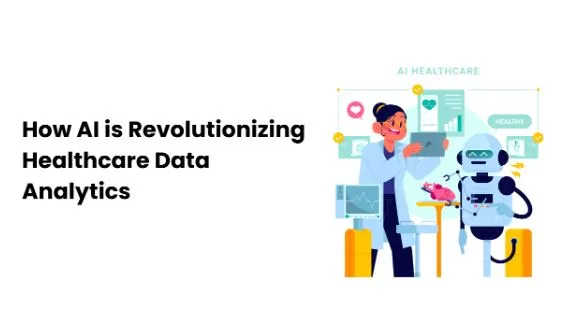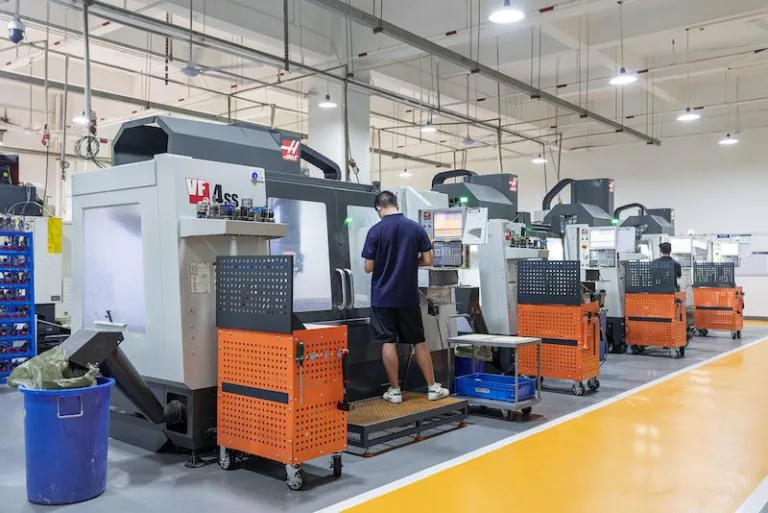How AI is Revolutionizing Healthcare Data Analytics
The medical sector stores and produces significant volumes of information on a per-second basis. It includes patient data, laboratory test results, and wearable device data. Nevertheless, doctors and other medical practitioners conduct lengthy and detailed analyses on a large amount of data. This is why AI in healthcare data analytics is advancing so rapidly. It aims at turning unprocessed data into raw insights.
Artificial intelligence can save the lives of patients, predict and prevent diseases, and optimize therapies in hospitals and research. Moreover, AI is revolutionizing the healthcare systems by transforming cost mechanisms and simplifying the decision-making process. AI in healthcare data analytics is quickly becoming the foundation of medicine today due to the rise in need for data-based solutions.
Understanding AI in Healthcare Data Analytics
The dynamics of information recognition and use have been changing the trends in healthcare systems availability based on artificial intelligence. AI in healthcare data analytics fundamentally pertains to the use of algorithms and ML models to interpret complex medical data. As compared to the traditional approaches, relying on human participation and rule-based mechanisms, AI can draw trends and relations that cannot be observed immediately by human experts.
Leveraging tools like NLP, predictive analytics, and deep learning, AI can analyze structured and unstructured data. This feature helps medical firms enhance diagnosis and treatment planning. It also enables the anticipation of patient needs, improves workflows, and boosts decision-making.
Key Applications of AI in Healthcare Data Analytics
The AI integration in Healthcare Data Analytics is boosting a shift in the way of data processing, interpretation, and application in the medical sector. AI helps healthcare experts to offer more precise, efficient, and customized care through the blend of vast datasets, advanced ML, and deep learning methods.
Let us find out some of the highly impactful applications:
1. Predictive Analytics for Early Disease Detection
AI predictive models analyze previous data, genetic information, and lifestyle data to identify patients at higher risk of getting into critical conditions. It enables healthcare professionals to detect warning signs at an early stage, resulting in timely intervention, optimized patient outcomes, and minimized treatment costs.
2. Clinical Decision Support Systems (CDSS)
AI-backed tools for clinical decision support facilitate real-time patient data processing, giving doctors data-based recommendations for diagnosis and treatment. CDSS eliminates human error, boosts diagnostic accuracy, and supports medical experts in making more informed decisions depending on patients’ insights.
3. Medical Imaging and Diagnostics
With the next-generation AI algorithms, radiology and pathology are both being revolutionized through the study of medical images (X-ray, CT scan, MRI, etc.) with great accuracy. AI can quickly and easily flag an issue that a human may have missed. AI allows for faster and more accurate diagnoses. In many cases, it not only streamlines but also allows for earlier interventions.
4. Personalized Treatment and Precision Medicine
AI in healthcare data analytics enables medical care experts to offer tailored treatments to individual patients. It is done by using processing genomic data, biomarkers, and clinical histories. Precision medical techniques offer customized therapies to patients’ genetic profiles, reducing adverse drug side effects.
5. Patient Monitoring and Wearable Data Integration
The current trend of wearable devices and remote monitoring has created massive health data in the form of vital signs, activity tracking, and sleep monitoring. AI interprets such a stream of data to identify anomalies on the fly, providing the opportunity to manage care proactively. Continuous changes in the condition of patients with chronic diseases reduce the adoption of readmission to the hospital, and the quality of life improves.
6. Drug Discovery and Development
Its applications include accelerating drug discovery, pre-predicting molecular interactions, targeting potential drug candidates, and clinical trial optimization. AI reduces the time and cost required to allow new drugs to enter the market due to its ability to analyze complex biomedical data. This aids pharmaceutical firms in developing new drugs and overall offering better treatment to patients. Dominio publicly traded stocks or mutual funds as he or she deems necessary.
Benefits of AI-Powered Healthcare Analytics
The integration of AI in healthcare data analytics isn’t just a technological advancement but a complete change to the way health practitioners provide care. When combining data intelligence and state-of-the-art machine learning capabilities, AI helps make hospitals, researchers, and care providers more efficient, accurate, and effective in improving patient outcomes. Just some of the major advantages stemming from AI-based healthcare analytics are
1. Improved patient outcomes
Artificial intelligence helps provide an earlier diagnosis of illnesses and tailored treatment protocols. Predictive analytics helps physicians foresee potential complications, enabling individuals to receive care that is prompt and effective, which will promote healing and recovery from chronic diseases.
2. Faster diagnosis, treatment planning
AI-based medical imaging can identify diseases such as cancer or heart disease in minutes. Self-processing data helps providers diagnose quickly and develop treatment plans without interruption. As a result, patients are able to receive life-saving interventions much sooner.
3. Reducing healthcare operation costs
By streamlining administrative processes and optimizing resources, artificial intelligence reduces costs through decreased unnecessary tests, readmissions, and operating costs. Healthcare facilities also have greater budget and resource control.
4. Enhanced data accuracy and efficiency
AI minimizes human error in handling patient data and mass datasets. Real-time processing ensures that there is access to accurate data at the decision-making point. Such accuracy strengthens trust between providers and patients directly.
5. Empowering healthcare practitioners with insights
AI solutions help doctors with evidence-based recommendations, patient history review, and optimal treatment. By choosing to hire AI developers, healthcare organizations can build intelligent systems that not only improve decision-making but also free up time for patient engagement. This, in effect, enables clinicians to do less data processing and focus more on delivering quality care.
Real-World Examples and Case Studies
Hospitals, drug makers, and startups are really trying out how to make changes to data. They are applying data analytics and machine learning to increase their game in terms of assisting patients, conducting research, and operating efficiently. The following are some of the ways change is actually occurring in health.
1. Hospitals
Places like the University of Rochester Medical Center are using systems to get faster, better diagnoses. They can flag people who need help first, which means better results and smoother care. By checking data from things like smartwatches and patient files, they can stay ahead of things like long-term illnesses and cut down on hospital trips.
2. Drug Companies
Big drug companies are getting in on the data game to speed up finding new drugs and running trials. Atomwise is working with others to use learning to look at molecules. Sanofi is using it to find good drug targets and guess how safe things are, cutting down the time it takes to get new drugs out there.
3. Startups
New companies like Komodo Health and MySense AI are providing platforms for checking tons of data and watching patients in real time. Komodo Health’s MapAI gives info on what sicknesses are going around. MySense AI uses sensor info to check on how people are doing. These changes give doctors the power to give cheaper, personal care.
Future of AI in Healthcare Data Analytics
Artificial Intelligence has a bright future in the area of Healthcare Data Analytics; technology evolves so rapidly that the limits of what is achievable, surpassing even our imagination, are quickly shifted. Healthcare organizations are creating changes to innovative models of care that are smart, predictive, and patient-centric, taking advantage of the rapidly growing list of innovations.
Forthcoming AI systems will become embedded to an extent in wearables, IoT-based health monitors, and EHR (electronic health records) and will utilize predictive, real-time analytics to assist in predicting the probability of health complications arising before they become life-threatening. Cloud-based AI platforms coupled with edge computing will enable all data gathered from patients around the world to be processed in real time. The AI solution will also incorporate a blockchain infrastructure underlying the overall AI solution to mitigate growing concerns around patient privacy and data security.
1. Telemedicine and Remote Care using an AI role
We are all aware of the rapid uptake of telehealth, which has changed current patient/doctor interactions, and the growing use of AI will take us to a new level. Soon-to-launch AI-based platforms will be capable of capturing and analysing changes in patient communication, patient speech (changes in tone and fluency), facial expressions, and biometric data during virtual check-ups will provide physicians with a better overall picture of illness and affect these interactions. Remote monitoring through AI will deliver chronic conditions management approaching a proactive level, early detection of emergencies, and a seamless manner of providing patient care and service without repeated admissions back into the hospital.
2. Promise of generative AI in healthcare insights
Generative AI will also be a key driver of innovation in healthcare analytics. It is able to mimic clinical trials and create synthetic medical data to provide research, as well as develop custom treatment simulations based on the patient. It will increase the pace of drug discovery and lower research expenditure and medicinal decision-making. Having a partnership with a generative AI development company will enable healthcare organizations to utilize these capabilities effectively to achieve safer and faster innovation.
Looking ahead, AI will not only assist healthcare providers but also allow patients to exert more autonomy in their health process. With these emerging trends, AI will soon take a central role in a predictive, more personalized, and connected health and care system.
Best Practices for Implementing AI in Healthcare Analytics
Successfully deploying AI in healthcare analytics involves taking a formal approach to secure the maximum benefits while resolving ethical, legal, and pragmatic challenges. Adherence to some of the established best practices also ensures that AI systems are effective, reliable, and responsive to clinical needs.
The following are the 5 best practices of deploying AI in healthcare analytics:
1. Ensure High-Quality, Diverse Data
Train the AI models using exact, entire, and representative healthcare data to evade bias and enable fair outcomes. Interoperability Opportunities Format and model training data, such as HL7 FHIR, to facilitate interoperability.
2. Stringent Model Development and Validation
Develop AI models based on clinically relevant outcomes. Validate externally using independent data sets to determine the model’s generalizability. Track model performance upon deployment on an ongoing basis for accuracy and drift.
3. Integrate AI into Clinical Workflows
Integrate AI tools natively into existing healthcare workflows to support rather than substitute clinicians. It ensures transparency and validity to allow healthcare providers to leverage the AI recommendations.
4. Demonstrate Regulatory Compliance and Data Privacy
Build powerful data security policies (including encryption, access control, and auditing) to address compliance issues. Guarantee patient privacy, and ensure AI systems comply with legal requirements and are ethical.
5. Encourage Interdisciplinary Collaboration
Teams comprising clinicians, data scientists, and AI developers. Work collectively in co-designing the AI solutions that respond to actual clinical needs. Place the end users at the center of development and deployment in order to streamline the tools and make the adoption possible.
Such best practices enable AI analytics in healthcare data and provide faster, ethical, and trustworthy uses in the healthcare sector. It aims to optimize patient care and operational effectiveness.
Conclusion
The adoption of AI in healthcare data analytics allows for early detection of medical conditions and more tailored treatment, thus transforming the healthcare system. With the advancement of technology, there is a requirement for unified efforts of clinicians, data scientists, and technology experts. Reaching out to an ideal healthcare app development company is also a good idea, as it makes solutions that are safe, simple to use, and efficient. AI-powered analytics promise to continuously redefine patient care and operational efficiency while fostering a more integrated and anticipatory healthcare system with untouched ethical and legal benchmarks.






